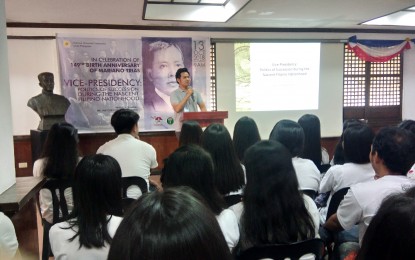
HISTORY AS A WAY OF LIFE. National Historical Commission of the Philippines (NHCP) Senior History Researcher Ian Christopher Alfonso (standing in podium) urges some 60 secondary education students of Cavite State University (CvSU) to "make history a way of life" during his lecture at the audio-visual room of the Museo ni Emilio Aguinaldo (MEA) on Saturday, Oct 13, 2018. The lecture was MEA’s offering to commemorate the 149th birth anniversary of the Philippines’ first de-facto Vice President General Mariano Closas Trias. (Photo by Gladys S. Pino)
KAWIT, Cavite – A senior history researcher of National Historical Commission of the Philippines (NHCP) over the weekend urged some 60 secondary education students of Cavite State University (CvSU) Cavite City campus to not just refer to history as a school subject but be ‘critical and mindful’ of the offered facts and lessons of the nation’s past events to understand and appreciate the society we have today.
Ian Christopher Alfonso gave his advice during a lecture on “Vice Presidency: Politics of Succession During the Nascent Filipino Nationhood” at the audio-visual room of NHCP-run Museo ni Emilio Aguinaldo (MEA) of the Aguinaldo Shrine here on Oct. 13.
Alfonso, a secondary education graduate major in Araling Panlipunan with a Master of Arts in History degree from the University of the Philippines-Diliman, highlighted to future teachers how the lessons of the past can be referred to in understanding the present, and help us in shaping our future.
The event is MEA’s offering to commemorate the 149th birth anniversary of the First Philippine Republic de-facto Vice President Mariano Closas Trias, who was born on Oct. 12, 1869 in the municipality of San Francisco de Malabon , now renamed General Trias City, in his honor.
According to the city government, Trias was first elected during the Tejeros Convention on March 27, 1897 under the Revolutionary Government, then again when the ‘Biak-na-Bato’ Republic was established on Nov. 1, 1897.
He was later appointed as Secretary of Finance on July 15, 1898, which he continued until a Cabinet was established by Apolinario Mabini on Jan. 2, 1899.
After the downfall of Mabini’s government when a new government under Pedro Paterno was established, Trias was appointed as Secretary of War.
During Saturday’s lecture, Alfonso also encouraged the millennials to only refer to trusted sources of history and, as Cavite is referred to as the historic capital of the Philippines, to “feel proud and honored to walk the trails of great men and women who fought with their lives for the country’s freedom.”
The lecture is just one of the many strategies that MEA embarks into to make history interesting to Filipino youth today, said MEA curator Haidee Paulette Bedruz.
MEA is considered as one of the most active under NHCP’s Cavite cluster, with Museo ni Baldomero ni Aguinaldo (MBA), located also in Kawit and the Museo ng Paglilitis ni Andres Bonifacio (Bonifacio Trial House) in Maragondon town.
It is located at the ground floor of the iconic Emilio Aguinaldo Shrine, in Kaingen village here and is open Tuesday to Sunday, from 8 a.m. to 4 p.m.
One can follow its social media accounts to be updated of its upcoming activities and events, or call +6346.484.7643 or email [email protected] for inquiries. (PNA)
